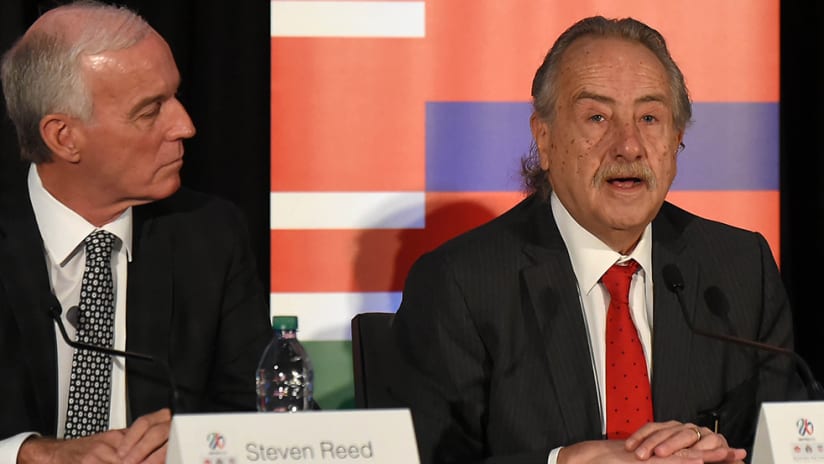When Carlos Cordeiro left the stage after the United Bid made its final pitch to voters at the FIFA congress on Wednesday morning in Moscow, the U.S. Soccer president was plenty confident that the United States, Canada and Mexico would win the rights to host the 2026 World Cup.
He didn’t quite expect to win in such a landslide, however.
Despite reports that big footballing nations like France and Italy would cast their votes for Morocco, the North American bid won in blowout fashion on Wednesday, receiving 134 votes to Morocco’s 65. (See FIFA's full voting breakdown here [PDF].)
“I would say about 10 days ago we had a sense this was breaking our way,” Cordeiro told reporters on a conference call following Wednesday’s vote. “I mean, to say that we knew it was going to be a landslide was probably unfair, but we knew it was going to go well for us. So, we’re very, very pleased in the end with the result and are delighted that it was quite the result it was.”
Ultimately, the United Bid won on its comparative merits. It received a significantly higher rating from FIFA than Morocco’s bid, offered much more certainty in terms of venues and infrastructure and promised billions of dollars more in revenue.
The win was rooted in those factors, but it also served as validation for the intense, exhaustive campaign led over the past few months by Cordeiro and fellow United Bid co-chairs, Canada Soccer president Steven Reed and Mexican federation chief Decio de Maria. The trio visited over 150 countries in the buildup to the vote, making individualized pitches to federations at home in North and Central America and the Caribbean, South America, Asia, Europe, Oceania and even Africa, where they managed to steal a few votes from some of Morocco’s fellow CAF members.
The three-month global tour ended in Moscow, where the federation chiefs arrived over the weekend ahead of Wednesday’s vote. The work didn’t end once the team arrived in Russia, however. Cordeiro, Reed and de Maria held follow-up meetings with federations in Moscow, chatted individually with countries they missed while on tour and on Monday and Tuesday, presented to all six confederation congresses.
Well before they touched down for the FIFA congress, however, the United Bid began by consolidating their support at home in the Western Hemisphere. Cordeiro, Reed and de Maria started their campaign by pitching to their fellow members of Concacaf, which, despite earlier reports that several Caribbean nations would vote for Morocco, fully backed the United Bid on Wednesday.
They followed up by heading to South America, where nine of 10 CONMEBOL countries – Brazil being the lone exception – ended up voting for the US, Canada and Mexico.
“We always had a very clear pathway to victory, we had that for some time and that basically triggered the strategy of trying to figure out how we get there,” Cordeiro said. “We’ve been saying for some time now that step No. 1 was to consolidate our support at home, meaning the Western Hemisphere. And today we got 100 percent of Concacaf, which is an incredible achievement considering the diversity and the makeup of Concacaf, and we got 90 percent of CONMEBOL, nine out of 10.
“I mean, isn’t that a great achievement? So, we started there and we were very successful in anchoring our support and got early momentum coming out of the Western Hemisphere.”
That was the simple part, however. The three joint bidders enjoy close relationships with their Concacaf brethren and with CONMEBOL countries, regularly playing South American nations in friendly matches and staging the 2016 Copa America Centenario in conjunction with them. The rest of the world would be trickier.
They decided to head to Asia first. None of the US, Canada or Mexico work all that often with their AFC counterparts, but the United Bid team sensed an opportunity in the region. They put in a huge amount of legwork, meeting with a slew of countries across the vast continent in hopes of securing a majority of the confederation’s votes. Their efforts paid off. Thirty-three of 46 AFC member nations voted for the United Bid on Wednesday, with one member (Iran) not voting for either bid.
Europe was next on the list. Cordeiro, Reed and de Maria once again took off for a full slate of meetings, sometimes traveling to and meeting with several different countries in the same day. Once more, their efforts paid off. Though some high-profile countries went for Morocco, 41 of 55 UEFA members ended up voting for the United Bid.
Most of Africa pledged their support to their confederation colleagues Morocco, but the United Bid took their thorough campaign to the continent, eventually earning the votes of South Africa, Zimbabwe, Mozambique and seven other African nations.
All that work helped pave the way for Wednesday’s landslide victory, a resounding win for the United Bid and landmark moment for North American soccer.
“We put together an amazing bid,” Cordeiro said. “We’ve got 23 fantastic venues across three countries, obviously supported by wonderful infrastructure, and hundreds and thousands of years of common culture – we share each other’s languages, each other’s food. So, we see this as a great celebration of football and something that we’re looking forward to.”













